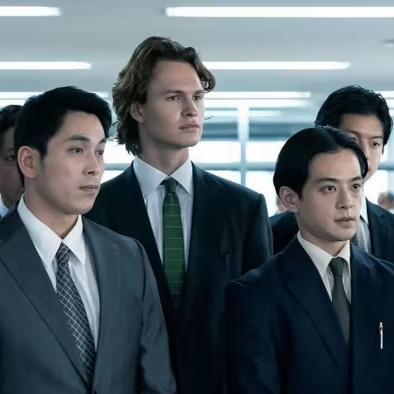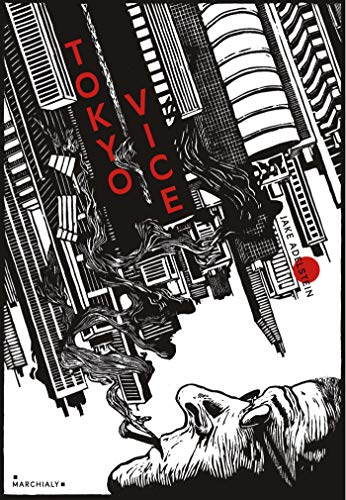Now the weather’s on the turn, you’ll be wanting a juicy thriller to get your teeth into, right? And Tokyo Vice, currently airing on the BBC, is just that series. Set in Tokyo in the ‘90s, the story follows a young American guy, Jake Adelstein, who becomes the first ever foreigner to get a job as a reporter at Yomiuri Shimbun newspaper.
However, alongside downing highballs with his colleagues and eating skewers at izakayas, he quickly gets pulled into Japan’s underworld when he’s placed on the police beat. While covering some particularly gory crimes, many roads lead him to the Yakuza, the Japanese mafia.
Directed by Michael Mann and starring Ansel Elgort as Adelstein (who replaced Daniel Radcliffe, who was originally tipped for the role), the eight-part series is actually based on the real-life story and career of Adelstein, who documented it all in his gripping 2009 book, Tokyo Vice: An American Reporter on the Police Beat in Japan. So what’s the true story behind Tokyo Vice, and how did a guy from Missouri end up exposing the “John Gotti of Japan”?
The backstory
Adelstein was born in 1969 and grew up on a farm in Missouri. Aged 19, after completing a freshman-year course in Japanese at the University of Missouri, he moved to Japan and studied at Sophia University. He became so fluent in Japanese and kanji that he took and passed the notoriously difficult exam to work at Yomiuri Shimbun (called Meicho Shimbun in the series), Japan’s biggest selling newspaper.
While on the police beat in the newspaper, he became aware of a mob boss called Goto Tadamasa (in the series renamed to Shinzo Tozawa). While being taken under the wing of a policeman (played by Ken Watanabe), he began to investigate Goto, and according to The New Yorker: “He had been making progress when one of his sources, a foreign prostitute, disappeared. Adelstein was convinced that she had been murdered, and soon he became obsessed with the case.”
Adelstein had unorthodox ways of getting leads and tip-offs, as he explained to The New Yorker: “I’ve slept with sources. I’ve done hard negotiations that are probably tantamount to blackmail. I’ve ransacked rubbish bins for information. I’m willing to get information from organized crime or antisocial forces if the information is good.”
But Yomiuri Shimbun was reluctant to publish stories about Goto, and Adelstein left the paper. He later told the Washington Post that he was threatened by Yakuza to kill the story, or be killed, just as in the beginning of the series: “‘Erase the story or be erased,’ one of them said. ‘Your family too’.’
However, he kept a close eye on Goto and finally Adelstein found an important link. It was less a case of “follow the money” and instead became “follow the liver.” As The New Yorker notes, Goto, writing in his autobiography Habakarinagara (With All Due Respect), revealed that he "drank enough to destroy three livers,” with Yakuza’s livers often suffering from the heavy drinking and drug culture that existed within the gang. Adelstein got a tip off that Goto had been given a liver transplant in America, where getting a visa would have been impossible because of his record. With further digging, he found his scoop: “Adelstein discovered that Goto and three other yakuza had been patients at the U.C.L.A. Medical Center. Goto had been granted a visa because of a deal with the F.B.I.— he had agreed to rat out other yakuza.” In addition, the centre also reported a $200,000 donation from the patients.
He broke the story in the Washington Post in 2008, with a follow up story in the LA Times. Since then, Adelstein has written several more books, and continues to write about the Japanese criminal underworld for The Daily Beast, Vice and The Japan Times.
How true is Tokyo Vice?
It has been disputed. When the series aired in America in early 2022, one article questioned the veracity of Adelstein’s story. In a feature for The Hollywood Reporter entitled Insiders Call B.S. on ‘Tokyo Vice’ Backstory, the journalist spoke to several sources who doubted the stories, with one saying: “I don't think half of that stuff in the book happened.”
Adelstein, on his Twitter account, hit back with a dropbox folder with many articles, documents, police reports – including one about the man who horrifyingly set himself on fire in front of Adelstein, as in the programme – and other information that backed his work up. He wrote: “Twitterdachi. Please share. Here is an updated folder of source materials used in my work and #TOKYOVICE. So you can decide what's credible. It also has some files related to unscrupulous journalists. Because it's true, a man without enemies is no man at all.”
Additionally, as Adelstein previously explained in his book, there were very obvious reasons as to why certain elements of stories needed to be changed: “I have taken great pains to explain why events were altered to protect people who confided in me, especially from retaliation by organized crime.”
Tokyo Vice is streaming on BBC iPlayer now.















